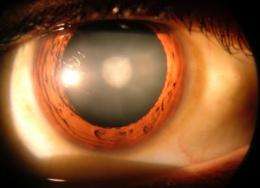New evidence that popular dietary supplement may help prevent, treat cataracts

Researchers are reporting evidence from tissue culture experiments that the popular dietary supplement carnosine may help to prevent and treat cataracts, a clouding of the lens of the eye that is a leading cause of vision loss worldwide. The study is scheduled for the July 28 edition of ACS' Biochemistry.
In the new study, Enrico Rizzarelli and colleagues note that the only effective treatment for cataracts is surgical replacement of the lens, the clear disc-like structure inside the eye that focuses light on the nerve tissue in the back of the eye. Cataracts develop when the main structural protein in the lens, alpha-crystallin, forms abnormal clumps. The clumps make the lens cloudy and impair vision. Previous studies hinted that carnosine may help block the formation of these clumps.
The scientists exposed tissue cultures of healthy rat lenses to either guanidine — a substance known to form cataracts — or a combination of guanidine and carnosine. The guanidine lenses became completely cloudy, while the guanidine/carnosine lenses developed 50 to 60 percent less cloudiness. Carnosine also restored most of the clarity to clouded lenses. The results demonstrate the potential of using carnosine for preventing and treating cataracts, the scientists say.
More information: "Protective Effects of L- and D-Carnosine on alpha-Crystallin Amyloid Fibril Formation: Implications for Cataract Disease," Biochemistry
Source: American Chemical Society (news : web)
















